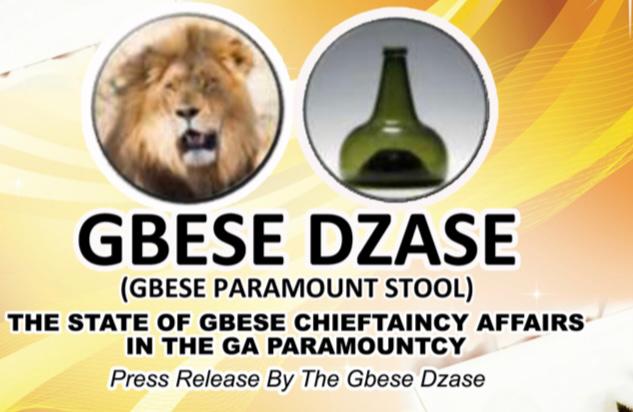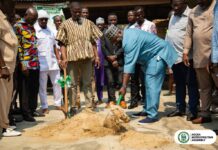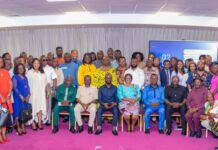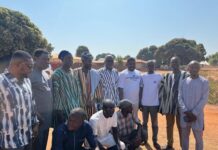Good morning, ladies and gentlemen, the media and respective invited traditional leaders, priests and principal elders of the Ga Paramountcy. All other protocols observed.
The Gbese Dzaase is extremely grateful for your attending to their invitation for this all-Important press statement on:
The state of affairs in the Gbese State in the Ga Paramountcy.
This press statement is premised on the urgent need to provide public information and clarity on traditional chieftaincy developments in the Gbese Paramountcy of the Ga State.
We present this press statement in our legitimate and lawful capacity as the Gbese Dzaase of the Gbese Stool of Ga Mashie. Additionally, we have the singular responsibility of upholding the dignity of the traditional royal institution of chieftaincy, especially the Gbese Stool and its collective leadership aspirations, principles and integrity.
Constitutional Mandate of the institution of chieftaincy in Ghana.
Fortunately, the traditional institutions of leadership have been recognised by various stages of our governance practices for centuries.
We restate the following landmarks of the recognition of traditional institutions for the benefit of establishing our mandate as custodial leaders of the Gbese Dzaase in the Gbese State.
1. The Independence Constitution Order-in-Council of 6th March, 1957, recognised and guaranteed the institution of Chieftaincy in accordance with customary law and usage, provided for regional assemblies, mainly with Local Government functions, and Houses of Chiefs in the regions.
2. Article 13 of the 1960 First Republic Constitution further guaranteed and preserved the institution of Chieftaincy but in the form that the Government wanted it. The Chieftaincy Act (81) of 1961 consolidated previous enactments on Chieftaincy.
3. The relevant provisions of the Constitutions of the Republic of Ghana for the First Republic of 1960, the 1969 Second Republic Constitution, 1979 Third Republic Constitution and the 1992 Fourth Republic Constitution guaranteed and preserved the institution of Chieftaincy together with its Traditional Councils.
4. It also barred Chiefs from taking part in active party politics, and that those who wish to do so should abdicate.
Gbese traditional chieftaincy mandate:
The Gbese Stool mandate is backed by the legal framework of various laws and statutory obligations of traditional royal authority which consists of the following:
1. Formal recognition by the Constitution of Ghana, of the traditional governance institution of chieftaincy and its various traditional leadership ramifications, principles and institutions.
2. Creation of a Ministry of Chieftaincy and Religious Affairs (MCRA) for policy management and oversight responsibilities for Chieftaincy affairs, as part of the Civil Service of Ghana was established by PNDCL 327, 1993.
3. The Ministry’s objective is to have oversight responsibility for Chieftaincy and Religious institutions for peaceful co-existence and national development.
4. Its specific functions and roles were provided by Executive Instrument (E.I.) 28 Civil Service (Ministries) Instrument 2017.
5. Recognition of National, Regional and Traditional Houses of Chiefs, which gives traditional authorities through administrative gazetted recognition a mandate of traditional governance under the decentralised traditional leadership systems in Ghana.
6. Responsibilities of traditional chieftaincy and family leaderships to be accountable for their respective stewardships in a manner proscribed by law.
7. The Houses of Chiefs are to undertake the evaluation of traditional customs and usages to eliminate outmoded and socially harmful practices.
Mandate of the Gbese Dzaase
The royal leadership status of the Gbese Stool is the “Adonten” or second in command in the Ga kingdom.
1. The traditional royal leadership management responsibilities of the Gbese Stool and Dzaase derive its authority from the collective leadership framework of the 1941 Gbese Agreement.
2. We, the Gbese Dzaase of the Gbese Stool have been extremely restrained for several years giving the critical position of the Gbese Stool in the traditional leadership and governance practices of the Ga Kingdom in the Greater Accra Region.
3. This respect for the rule of law and calm royal posturing of the Gbese Dzaase and the legitimate royal leadership of the seven clans constituting the highest royal court authority has been misconstrued by certain opportunists and persons as weakness. This however is not the case.
4. Gbese Dzaase Leadership and mandate is based on the Gbese 1941 Agreement. For the avoidance of doubt, the seven royal clans and their respective royal houses and families are duly recognised by their assenting to the 1941 Gbese Agreement.
5. That mandate recognises the leadership of the seven royal houses of Gbese as follows:
a. Wekuyitso Plenshiaku We aka Shia Wulu
b. Wekuyitso Tetteh Ankama We
c. Wekuyitso Akote Krobo Saki We
d. Okai Odebae We (Shippi)
e. Wekuyitso Afiye We (Stool Wulomo)
f. Wekuyitso Nyan Abodiamo We/Kreshie We (Dzasetse)
g. Wekuyitso Arde Akwa We (Akwashongtse),
The assembly of principal elders of the Gbese Dzaase Council is presided over by the Dzasetse from Nyan Abodiamo -Kreshie We.
Other principal elders of various houses are ex officio members of the Gbese Council.
Lawful Gbese Mantse
There are three ruling clans recognised by the 1941 Gbese Agreement.
These ruling clans are:
1. Plenshiaku We or Shiã Wulu
2. Tetteh Ankama We
3. Akote Krobo Saki We
These ruling clans by a principle of rotation provide prospective candidates for vetting and installation proceedings to the position of Gbese Mantse. For the avoidance of doubt, be informed by the legitimate Gbese Dzaase, that to the best of our knowledge, we have not participated in any installation of a Gbese Mantse after the demise of Nii Ayitey Abofu. According to the 1941 Agreement and rotating principle of installation proceedings, the ruling clan to present a candidate for installation was Akote Krobo Saki clan and not Naa Akua Onidin/Akwetey Krobo Saki We.
There are also four royal clans of the Gbese Dzaase membership that constitute the kingmakers. These kingmaker clans are:
1. Nyan Abodiamo We Kreshie We Principal Dzaase and Kingmakers
2. Okai Odebae
3. Arde Akwa We
4. Afiyea We
The Gbese Dzaase therefore comprises the collective of the three ruling clans/houses and the four kingmaker clans/houses. This body of seven royal clans constitutes the highest statutory royal court of the Gbese Stool.
The Gbese Dzaase principally performs all the installation proceedings of the Gbese Stool with respect to the installation of a Gbese Mantse in accordance with the traditional protocols and principles of compliance.
1. The totality of the installation proceedings is a process of several rites with the respective traditional and spiritual leadership of the Gbese Stool and the Ga Paramountcy.
2. We have monitored several illegal law suit assertions by the late Tetteh Ahinakwah of Naa Akua Onidin Akwetey Krobo Saki We and one Thomas Okine to the effect that Tetteh Ahinakwah has installed Thomas Okine as Gbese Mantse. That purported installation is illegal and cannot be legitimate since this installation was not recognised as being from the ruling Akote Krobo Saki clan of Gbese.
3. It is a known fact that Thomas Okine’s purported installation as Gbese Mantse failed to follow the laid down traditional norms and procedures as required by the 1941 Gbese Agreement.
4. Attempts by Nii Tetteh Ahinakwah to install Thomas Okine as Gbese Mantse are absolutely illegal and not in compliance with the 1941 Gbese Agreement.
5. We state empathetically that there is legally no Gbese Mantse installed by the Gbese Dzaase.
6. Additionally, per the judgement of the Supreme Court in the case NO. J4/20/2009 on 29TH APRIL, 2010 the judgement categorically declared that Nii Okaija Annan and Thomas Okine are not chiefs of the Gbese Stool.
7. The legitimate collective of the Gbese Dzaase of the Gbese Stool never participated, nor recognises any successful candidate or has evidence of any installation of a legitimate prospective candidate as a Gbese Chief.
a. Additionally, for the records, we are minded by a judgement of the Supreme Court in the case under reference NO. J4/20/2009 on 29TH APRIL, 2010 involving Thomas Okine which again reinforces the legal position that Thomas Okine has no legal justification to hold himself up as Gbese Mantse.
b. In spite of the foregoing, Thomas Okine went on contemptuously procure a gazette from the National House of Chiefs.
c. For well over a decade, Thomas Okine has undermined the Gbese Stool and the Dzaase leadership. He contemptuously continues in his cynical unlawful manner to interfere and prevent various clan leadership from performing their respective royal leadership obligations, as Gbese Dzaase of the Gbese Stool and Ga Paramountcy.
d. Thomas Okine’s total disregard for the principles of succession outlined in the Gbese Stool 1941 Agreement if unchecked and sanctioned, creates a dangerous precedent which serves the illegal usurpation of royal traditional leadership aspirations of legitimate royal clans, houses, families and their people.
By this press statement, we are going to formally engage and notify the respective statutory institutions to respect the judgements and rulings that estopped Thomas Okine and Tetteh Ahinakwah from seeking to ignore the effect of the judgement and rulings.
The ruling categorically rebuked Tetteh Ahinakwah from presuming that Naa Akua Onidin/Akwetey Krobo Saki was the same as Akote Krobo Saki We specifically mentioned in the ruling of Ofosu Quartey.
Shared misconduct
1. Thomas Okine’s claim that he was installed Gbese Mantse by one Tetteh Ahinakwah who was categorically told in a court ruling by Justice Ofosu Quartey that Naa Akua Onidin/Akwetey Krobo Saki is not a name recognised by the 1941 Gbese Agreement clearly establishes that Thomas Okine’s candidacy to the Gbese Stool is an illegality.
2. It is our expectation that Thomas Okine would be formally called and engaged to be notified accordingly.
3. Failure to respect the integrity of the court judgements and rulings to the effect that he was never and not a legitimate royal candidate for vetting proceedings as well as installation proceedings to be out doored as a Chief of Gbese will lead to contempt proceedings against him.
4. By Thomas Okine ‘s continuing posturing as Gbese Mantse, Thomas Okine totally disregards the compelling the Supreme Court judgement delivered in his very presence which clearly indicated that Nii Okaija Annan and Thomas Okine are not chiefs of Gbese and that the Gbese Dzaase should proceed to install the legitimate chief.
5. Thomas Okine’s continuing posturing as Gbese Mantse is a deliberate disrespectful contempt of the Supreme Court judgement which requires legal contempt proceedings in the Supreme Court, the National, Greater Accra Houses of Chiefs, the Ga Traditional Council and the Gbese Dzaasefoi to establish strict compliance with the Supreme Court judgement.
6. Illegality cannot be countenanced as a precedence to usurpation of laid down royal leadership norms and procedures for installation proceedings of traditional chieftaincy and royal court leadership.
7. Thomas Okine further high handedly demolished the ancestral stool palace without consultations and regard to the Gbese Dzaase for its historic preservation and relevance.
8. Thomas Okine is disrespectfully undermining all the legitimate royal leaderships of the Gbese Stool and Dzaase.
Seize and desist
Clearly the Gbese Dzaase cannot continue to tolerate the confusion and impunity of Thomas Okine any further.
Thomas Okine has been acting for over a decade in complete disregard and contradiction of the Supreme Court judgement.
The disrespectful effect of his actions on the Supreme Court judgement raises questions about his impunity and arrogant behaviour and continuing negative impact on the well being and sanctity of the rule of law.
Thomas Okine will be made to face the full consequences of his actions and continued contempt.
Thomas Okine must be restrained from undermining any further the authority of the court by his posturing and unlawful activities as Gbese Mantse together with his illegal Dzaase and assigns.
Divisional elevations to Paramountcy
Recently a number of divisional stools were elevated to paramountcy status. The newly elevated paramount stools include Akanmadjen, Otublohum, Sempe, Gbese, Abola and Asere Tsono.
The traditional royal court divisional stools recently elevated to paramountcy require their respective stool structures to be realigned to reflect the specific leadership responsibilities and ranking order of their respective stools and courts.
Following the recent elevation of the Gbese divisional stool to a Paramountcy, it behaves on especially the Gbese Dzaase to provide guidance in the appropriate structural royal court leadership arrangements of the Gbese polity to facilitate a smooth transition of the Gbese Dzaase leadership and its royal court leadership as critical divisional structures of governance.
This consultative transitional framework is critical to avoid structural distortions and usurpation of royal court leadership roles and responsibilities, principles, procedures and protocols.
We note with concern that the current disregard for the hierarchical structure of the Gbese Stool by Thomas Okine forebodes serious concerns which if unchecked would gravely distort the established royal status quo.
Youth empowerment and job creation
Our meeting today will be incomplete without a message of hope and upliftment to our Ga Paramountcy and especially our future leaders – the youth.
We take this opportunity to re-dedicate our collective leadership commitment to influence government and our royal leaderships to ensure the socioeconomic development needs of our people are addressed.
Ga Mashie is the heart beat of Accra, the capital city of Ghana. Unfortunately, the Ga citizenry have not received any structured socioeconomic development policies to protect the indigenous people from the economic challenges of urbanisation. Housing, sanitation, education and health and safety challenges have made us vulnerable.
Accra which used to be the pride of Ghana is engulfed in choking filth on a daily basis. Our roads generate huge air pollution and pedestrians struggle to walk on non-existent walkways taken over by hawkers and truck pushers. That is the price we have to pay for attracting huge migrants and commercial activities into our urban space.
These stark challenges have further undermined our traditional and royal culture and values as a people.
It is the prime objective and commitment of the Gbese Dzaase leadership working closely with the Ga Paramountcy and our spiritual leadership and youth groups to develop strategies to engage the youth especially for our cultural revival through job creation initiatives.
This can only be achieved when the critical values of our collective royal leadership are not compromised by opportunistic elements who only seek their personal gains at the expense of the collective will of the people.
As a law abiding legitimate royal leadership of the Gbese state, we shall pursue all legal means to restore the dignity and integrity of our Gbese people in Ghana.
We thank you most sincerely for attending to our call today and look forward to further engagements in our quest to restore peace and prosperity to the people of GBESE and Ga Mashie and its towns and villages.











